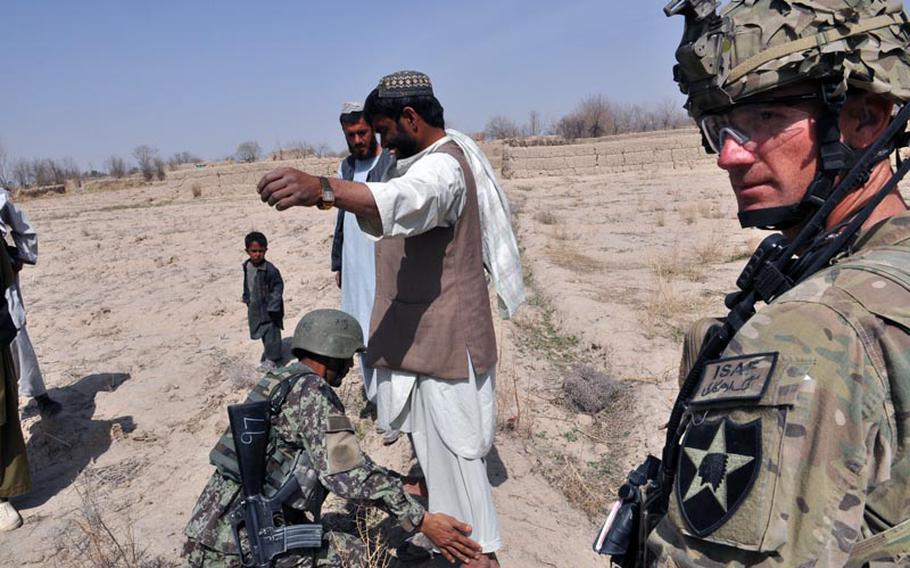
An Afghan soldier searches a villager in in Kandahar province while a U.S. soldier looks on. A spike in killings of international troops by their Afghan counterparts has coincided with an effort by the Western military coalition to hand off more security responsibility to Afghan forces. (Heath Druzin/Stars and Stripes)
American generals and civilian officials have all but written off what was once one of the cornerstones of their strategy to end the war in Afghanistan: battering the Taliban into a peace deal.
The New York Times reported Tuesday the once ambitious plans for talks that would end the war are being replaced by the far more modest goal of setting the stage for the Afghans to work out a deal among themselves in the years after most Western forces depart, and to ensure Pakistan is on board with any eventual settlement.
Military and diplomatic officials in Kabul and in Washington told the Times that despite attempts to engage directly with Taliban leaders this year, they now expect that any significant progress will come only after 2014, once the bulk of NATO troops have left.
“I don’t see it happening in the next couple years,” a senior coalition officer was quoted as saying. “It’s a very resilient enemy, and I’m not going to tell you it’s not,” the officer said. “It will be a constant battle, and it will be for years.”
Moreover, the retreat of Western forces from Afghanistan could be sped up, the head of NATO told the British newspaper the Guardian, in a report published Tuesday.
Conceding that the recent Taliban strategy of “green on blue” killings had sapped morale, NATO Secretary-General Anders Fogh Rasmussen said that options for a faster withdrawal from were being studied and should be clear within three months.
“From now until the end of 2014 we will see announcements of redeployments, withdrawals or drawdown,” he told the paper. “If the security situation allows, I would not exclude the possibility that in certain areas you could accelerate the process.”
Rasmussen acknowledged that the killings of almost 50 allied troops this year in “green on blue” attacks — Afghan security forces turning on their trainers and mentors – had damaged the relationship between the international forces and the Afghan police and military.
“There’s no doubt insider attacks have undermined trust and confidence, absolutely,” he told the Guardian.
Amid mission creep fatigue across Europe, squeezed defense budgets and sweeping austerity cuts, it is not clear how many of the European NATO allies will contribute troops to the training mission planned for after 2014. Defense ministers meet next week in Brussels to start planning the operations.
The failure to broker meaningful talks with the Taliban underscores the fragility of the gains claimed during the surge of American troops ordered by President Obama in 2009, The Times noted. The 30,000 extra troops won back territory held by the Taliban, but by nearly all estimates failed to deal a crippling blow.
Among America’s commanding generals here, from Stanley McChrystal and David Petraeus to today’s Gen. John Allen, it has been an oft-repeated mantra that the United States is not going to kill its way out of Afghanistan. They said that the Afghanistan war, like most insurgencies, could only end with a negotiation.
Now American officials tell the Times that they have reduced their goals further, to laying the groundwork for eventual peace talks after they leave. American officials say they hope that the Taliban will find the Afghan Army a more formidable adversary than they expect and be compelled, in the years after NATO withdraws, to come to terms with what they now dismiss as a “puppet” government.
The United States has not given up on talks before that time. It agreed last month to set up a committee with Pakistan that would vet potential new Taliban interlocutors, and the Obama administration is considering whether to revive a proposed prisoner swap with the insurgents that would, officials hope, reopen preliminary discussions that collapsed in March, current and former American officials said. Those are both seen as long-term efforts, however.
Bringing Pakistan into the search for Taliban contacts is also an uncertain strategy. The details of the new vetting committee have yet to be worked out, and “if we are depending on Pakistan, it comes with an asterisk,” one of the officials told the Times. “We never know whether they will see it through.”
For a brief moment, a strategy of talks appeared to be working: preliminary talks, painstakingly set up throughout 2011, opened early this year in Qatar.
The effort fell apart when the Obama administration, faced with bipartisan, could not make good on a confidence-building measure, swapping five Taliban leaders held at Guantánamo Bay, Cuba, for the sole American soldier held by the insurgents, Sgt. Bowe Bergdahl.
The prospects for direct negotiations between the Afghan government and the Taliban, the Times noted, are even murkier.